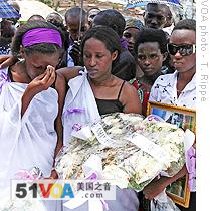Kigali, Rwanda
10 April 2009
 |
| Rwandans continue to bury victims of the 1994 genocide that left 800,000 dead |
The men were released after the British High Court decided that the UK lacked jurisdiction to try the suspects and that the suspects would not receive a fair trial in Rwanda and therefore could not be extradited.
Rwandans like Yvonne Umugwaneza are deeply angry about the decision. She says it's especially disappointing since the UK has been such a strong supporter of Rwanda."If the UK releases four suspects, tomorrow they will release maybe ten if they have. This will happen in France like it happened before. If this happens in the whole Europe, what about the rest of the world? I'm not sure that also the United States will also make the difference. I'm not sure. And if the whole world is against the good justice for the suspects of the Rwandan genocide, what next? It's like all countries, all states, are denying the genocide in Rwanda," she said.
In April, 1994 unknown assassins shot down the plane carrying then-President Juvenal Habyarimana. The death of Habyarimana, a Hutu, set off a wave of violence against Rwanda's Tutsi minority. Over the next 100 days extremist Hutu militia killed 800,000 Tutsis and moderate Hutus.
Ever since then Rwanda has been working to achieve some sense of justice. Trials continue to this day in Rwanda's traditional gacaca courts and at the International Criminal Tribunal for Rwanda, based in neighboring Tanzania. And the international hunt for perpetrators also continues.
Martin Ngoga, Rwanda's Prosecutor General, says that while he is disappointed with the decision, he also appreciated the efforts of British prosecutors"The Crown Prosecution did a lot of work, they spent quite a lot of resources, they spent quite a lot of time. Their investigators were here, some of them I think stayed here for one year, working on these cases. We have never received a level of cooperation from one country than we received from the Crown Prosecution services in the UK," he said.
So while Rwandans still view the United Kingdom as friends, Umugwaneza and others are concerned about the consequences of the release of the suspects."I'm not happy, as a genocide survivor. I'm not at all happy. Because this is not a good example from the UK," she said.
Rwandans are very suspicious of European ideas of justice, especially after the arrest of Rose Kabuye, chief of protocol for President Paul Kagame, in Germany last year. That arrest led to Rwanda asking the German government to recall its ambassador, seriously straining relations between the two countries.